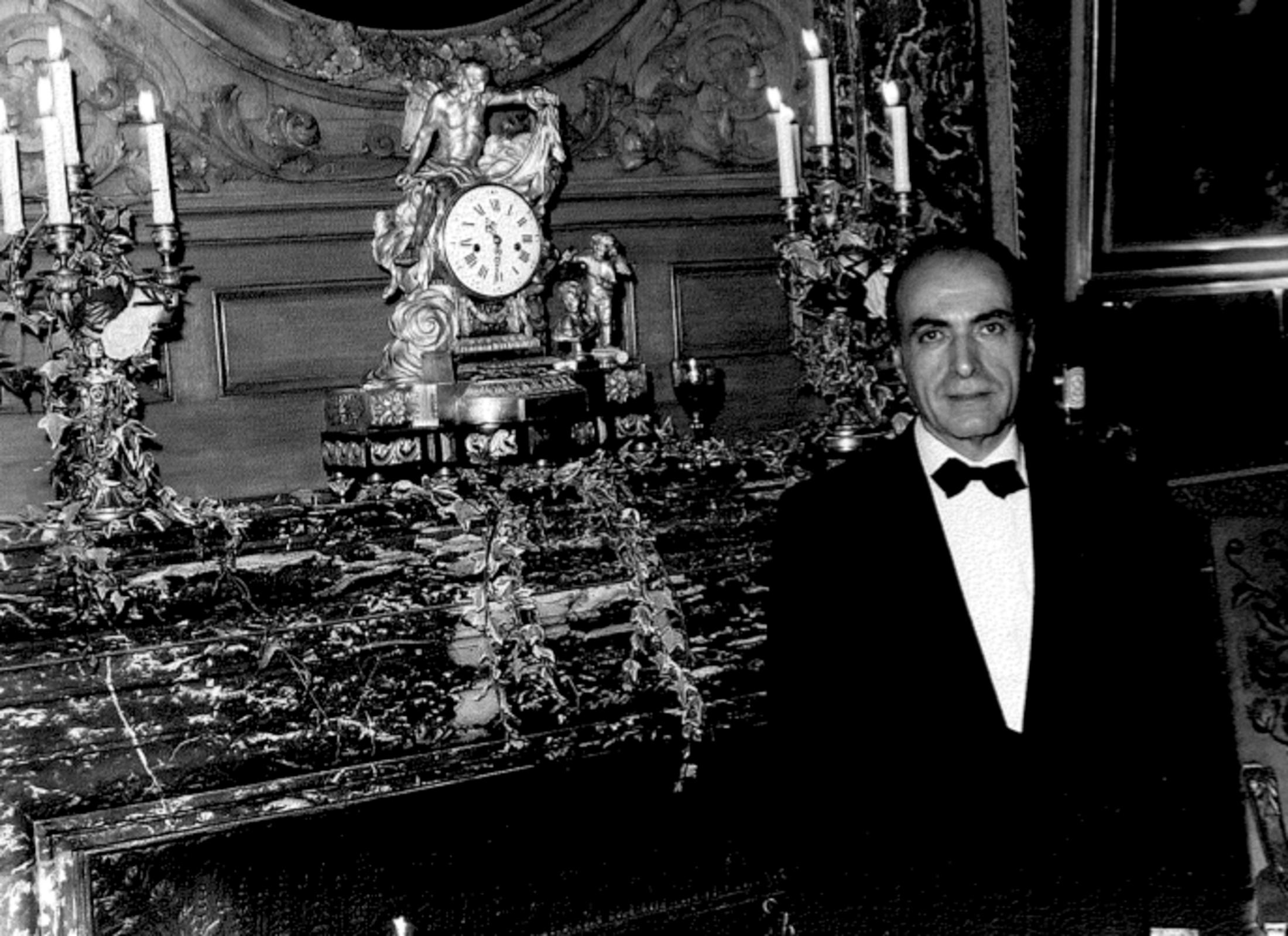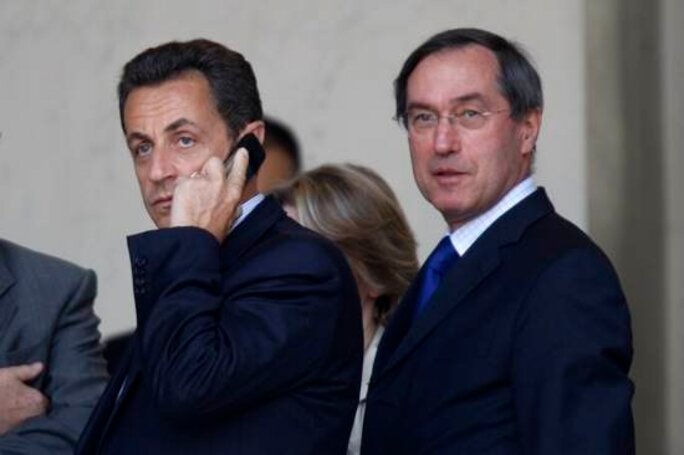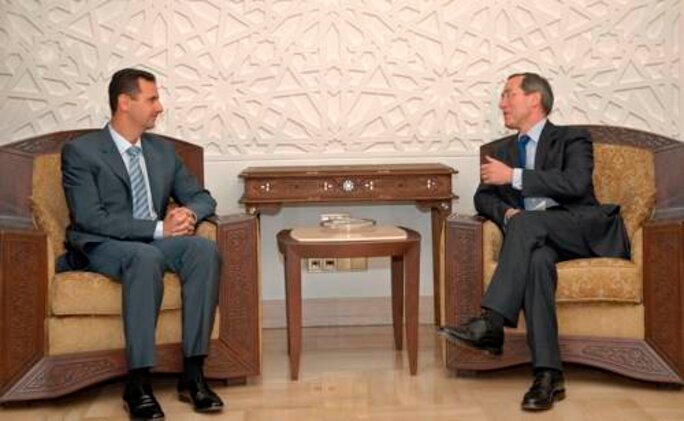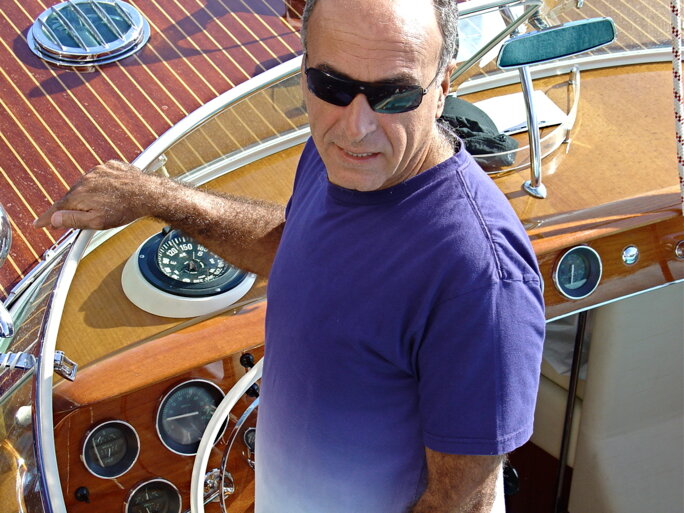Franco-Lebanese businessman Ziad Takieddine, 61, is cited as a key witness in ongoing investigations led by Paris-based examining magistrates Renaud Van Ruymbeke and Roger Le Loire into suspected illegal political financing in France from the sale of three French Agosta class submarines to Pakistan in the 1990s. The magistrates' enquiry was launched after suspicions that the significant sums officially destined as commissions - or bribes - to Pakistani officials ended up returning, illegally, to France to fund political activities. Suspicion centres on former prime minister Edouard Balladur's political movement and unsuccessful 1995 presidential election campaign, for which his budget minister, Nicolas Sarkozy, also served as official campaign spokesman.
Several witnesses questioned by the magistrates have designated Takieddine as a key intermediary in the 1994 contract who was imposed on the deal by Balladur's government shortly before it was concluded. Balladur, Sarkozy and Takieddine have firmly denied knowledge of illegal political funding via the commissions.
Written and photographic documents exclusively obtained by Mediapart and published in the seven preceding reports in this series have demonstrated the very close and longstanding links, both professional and social, between Takieddine and Nicolas Sarkozy's immediate entourage. Mediapart has revealed how Paris-based Takieddine surprisingly pays no income nor wealth tax in France, his fiscal domicile and where, according to documents signed by him, his personal fortune has an estimated value of more than 40 million euros.
Mediapart has further disclosed how in 2003 Takieddine was destined to receive 350 million euros in secret commissions from another arms contract, this time with Saudi Arabia, negotiated on behalf of Nicolas Sarkozy's aides via a company run by the French interior ministry when it was headed by Sarkozy. Mediapart has also disclosed how the arms dealer, while negotiating that contract, was saved by Sarkozy's entourage after an alleged assassination attempt on the exclusive Caribbean island of Mustique. In its last report, Mediapart detailed how Takieddine was mandated by Nicolas Sarkozy's staff, before and after he became French president, to negotiate major weapons and security contracts with the Libyan regime of Colonel Muammar Gaddafi. Takieddine was notably an intermediary in the sale of an encrypted signals system to counter Western surveillance operations.
Mediapart can now reveal how Ziad Takieddine played a central role in establishing close ties between France and Syria in the period between 2007 and 2009, including the introduction of French President Nicolas Sarkozy to Syrian President Bashar al-Assad. This behind-the-scenes, go-between role reached a high point in 2008, with President Assad's visit to Paris in July and President Sarkozy's visit to Damascus in September that same year, for which the arms dealer was the key organizer.
In return, Takieddine took part in negotiations led by French oil giant Total for contracts in Syria. According to internal notes and documents from Total, exclusively obtained by Mediapart, President Sarkozy leant political support to Takieddine's involvement in the discussions.
Just as he did in negotiations with the Libyan regime, Takieddine placed himself as one of the essential intermediaries for French companies hoping to do business with Damascus, while also acting out the role of unofficial representative of the French state. He did so with the intention of receiving secret commission payments, notably by obtaining deals for oil and gas field operating rights.
Total confirmed it had links with Takieddine, but insisted it had never paid Takieddine in connection with its projects in Syria, either directly or indirectly. The French presidential office did not reply to our request for a response to the issues raised in this article.
Just as in dealings with Saudi Arabia and Libya, as previously reported in this series of investigations, it was the current French interior minister Claude Guéant, when he was President Sarkozy's chief-of-staff (secretary-general of the Elysée Palace), who put into place the process of rapprochement with the Syrian regime, a process planned by Takieddine. According to reports written by Takieddine, also obtained by Mediapart, Guéant was regarded as an "exceptional man" by the Syrian President, who was grateful for France's role in providing him with "rehabilitation" on the international scene.
Takieddine acted as a secret advisor for Guéant, involved in preparing confidential reports, translations, advice on the wording of contacts, and in holding secret meetings with Syrian emissaries in Europe. His activities side-stepped the French foreign ministry which, under then-foreign minister Bernard Kouchner, was reluctant to develop links with the Syrian regime.
Takieddine proclaimed 'the position of France'
The arms dealer's first intervention in Syria on behalf of the French presidential office was at the end of 2007, during the settlement of the political crisis in Lebanon that resulted from the assassination, two years earlier, of one of Lebanon's leading political figures, former prime minister Rafic Hariri.
From January 2008, Takieddine took on the role of unofficial spokesman for Nicolas Sarkozy in contacts with the Syrians. Initial contacts had begun badly, while Syria continued to block efforts to reach a solution to the Lebanon crisis - a stalemate that was finally broken following the election of Michel Suleiman as Lebanese president in May 2008.

Enlargement : Illustration 1

In his notes, Takieddine referred to a meeting he held with Syrian officials during a visit to Damascus on January 1st 2008. He wrote (see documents in Scribd box below) that the object of his visit could be "summed up" as intending "to signify to Syrian officials the bitterness of President Sarkozy regarding the failure of successive initiatives begun by France. This bitterness is as strong as the hopes and confidence the President had had in Syria's credibility."
"It is obvious", the note continues, "that everything that happens is imputed to Syria and that despite this France has done everything to avoid holding them responsible for everything."
Takieddine continued: "President Sarkozy would like there to be no ambiguity. He absolutely wants a President of the Republic of Lebanon to be elected. He would like to elect [sic] a consensual President chosen by all the Lebanese. He also hopes that this President of the Republic could be a man of stature and a man without animosity towards Syria, who would be approved by the Syrians and their allies."
He then commented: "This is the position of France".
Ziad Takieddine's report on his January 2008 visit to Damascus.
On January 17th 2008, just several days after that note was written, Takieddine met in Berlin with Syrian foreign affairs minister Walid al-Moallem to once again make clear France's position on the Lebanon crisis. In a report on the meeting, written up the following day, January 18th, Takieddine commented that his "interlocutor" wanted "to confirm his total confidence" in the French move.
Sarkozy told Assad of his 'esteem' for Syria
Then on February 12th 2008, the arms dealer prepared a mysterious report entitled "The Substance" (see documents in Scribd box immediately below). Its objective appears to be to provide Syria, despite the inherent difficulties, with an image of respectability. He wrote: "The latest statements have created a situation which leads to believe that there is an ambiguity about France's position, notably through the repeated interventions of the Minister of Foreign Affairs [Bernard Kouchner] which could be subject to interpretations that put in doubt the moves made with Syria".
Among the "plans of action" relayed by Takieddine are an "agreement with France, on a proposition by France, for the supply of civil nuclear energy/AREVA" and a Franco-Syrian agreement to "have Hamas enter into the negotiations with Israel".
Ziad Takieddine's report on 'The Substance'.
During the same period as the notes were written, the situation in the Lebanon remained chaotic. After meeting with Syrian foreign affairs minister Walid al-Moallem in Damascus on February 12th and 13th 2008, Takieddine wrote in a report that the Syrians "felt they had to resign themselves to the fact that they had little to hope for from the French initiative following the anti-Syrian statements", referring to comments by Nicolas Sarkozy and Bernard Kouchner.

Confusingly, Takieddine also noted that al-Moallem had assured him of Syria's "renewed" confidence in the "actions and determination of Claude Guéant and President Sarkozy".
Following a political settlement to the crisis in Lebanon, Michel Suleiman was sworn into office as the country's new president on May 25th 2008. This marked the beginning of an improvement in relations between Paris and Damascus.
In a non-dated report entitled "France-Syria relations after the election of the President of Lebanon", Takieddine wrote (see document in Scribd box immediately below): "Syria would like France, after a long absence, to enter the region through the front door."
"The confidence of President Assad is total", Takieddine continued, "given the quality, the dynamism and the will of President Sarkozy to assume this role for France. He will find in Syria an effective partner playing its role as a very important actor in the region."
Ziad Takieddine's report 'France-Syria relations after the election of the President of Lebanon'.
On May 30th, Takieddine prepared a "confidential" report entitled "Telephone conversation", about a phone discussion between President Sarkozy and his Syrian counterpart, President Bashar al-Assad. It would appear that Takieddine was either personally present during the conversation, or was closely informed of what was discussed. The report (see Scibd box page 4) began: "President Sarkozy, with consideration for Syria and the role it played in solving the Lebanese crisis, wanted to confirm his esteem for Syria and to give his visit to Damascus and exclusive and official character, by disassociating it with his planned lightening visit to Lebanon."
He then detailed the organization of the Syrian President's visit to France before Sarkozy's visit to Syria: "President Sarkozy also wanted, during the telephone call to President Assad, to confirm to the latter his invitation to the Summit of Mediterranean Countries, set for next July 13th in Paris, and to invite him to be at his side for the July 14th parade." (The latter refers to France's traditional Bastille Day military parade and fly-past and the ceremonial tribune where the French head of state and foreign dignitaries gather to watch the celebrations).
Takieddine's 'immense' thanks to Guéant
In the same report on the phone conversation (see document in Scribd box immediately below), Takieddine noted: "The French President underlined the will of France to set up projects in various economic areas", notably those of "aviation" and "oil".
The May 30th report ends with mention of a preparatory visit to Syria by Claude Guéant, referred to as "C.G.". This indeed took place two weeks later, on June 15th 2008, when the then presidential chief-of-staff met with President Bashar al-Assad.
Ziad Takieddine's report 'Telephone conversation'.
The documents obtained by Mediapart reveal how Guéant's trip to Syria was prepared from beginning to end by Takieddine, who sent the Elysée Palace secretary-general three reports before the visit began. These were preceded (see document in Scribd box further below) by an intriguing note from Takieddine: "I wish you a very good trip and a well-merited grand success [...] For all that you do, for all that you have done, for all of that, immense thanks. Friendly wishes, Ziad."

According to Takieddine's notes, Damascus had prepared a warm welcome for Guéant. In a "note to be delivered personally to Monsieur Claude Guéant", he wrote: "In accordance with the French initiative at the beginning, Syria wishes to maintain and reinforce its strategic and distinguished relations with the President, Monsieur Nicolas Sarkozy, and to turn the page on relations with the former [French] President Chirac."
Ziad Takieddine's 'immense thanks' to Claude Guéant.
The day after the meeting between Guéant and Assad in Damsacus, Takieddine held talks with Syrian foreign affairs minister Walid al-Moallem. In a note addressed to Guéant and dated June 16th 2008 (see document in Scribd box immediately below), the arms dealer wrote: "Your visit and the meetings held in Damsacus, yesterday, have been very productive and constructive. They constitute an essential step in the Franco-Syrian rapprochement."
It continued: "My interlocutor particularly wanted to inform me of their determination to develop bilateral relations between France and Syria, and this in every domain."
Takieddine also mentioned the Syrian dictator's praise for Guéant. "My interlocutor particularly wanted to confirm the excellent impression that Monsieur Claude Guéant continues to give to President Assad, as well as to himself. They consider him as an exceptional man and it is he who will assure relations at a very top level."
Ziad Takieddine's June 2008 note on Damascus talks.
The arms dealer appears to have taken on the role as the French presidency's exclusive emissary for Syria, flouting all official diplomatic channels. On July 7th 2008, one week before President Assad's ceremonious official visit to Paris, Takieddine travelled to Damascus to meet with the Syrian dictator in person. The message he transmitted was, according to his own notes (see Scribd box top of page 5), to make clear that the invitation to Assad was "on France's part an attempt to bring Syria back to the Western and democratic ‘cradle'". He underlined that, in return, "the Syrian head of state needs a relationship of personal confidence with the French President".
Takieddine noted that the Syrian dictator told him that "in the same way that the French President is concerned about the perception that French public opinion will have of the Syrian President's visit to France, Arab opinion also watches with much attention what will result from the visit".
'Hard work for Total'
To prepare his visit, Assad agreed to give an interview to French daily Le Figaro, which Takieddine observed in his notes was "remarkably well led" by the paper's editorial director Etienne Mougeotte. Mediapart has disclosed the links between Mougeotte and Takieddine in a previous report in this series.
Ziad Takieddine's report on his July 7th 2008 meeting with President Assad in Damascus.
Immediately after Assad's visit to Paris, Takieddine again travelled to Damascus, on July 17th 2008. In his report about the trip, Takieddine details the warm greetings of the Syrian regime and how all appeared on perfect course for Sarkozy's visit to Syria, planned for September 3rd and 4th of the same year.

Enlargement : Illustration 11

"President Bachar al-Assad and Monsieur Wallid al-Moallem particularly wanted to transmit a message of thanks and friendship to President Nicolas Sarkozy, and also to Monsieur Claude Guéant, for the welcome and also the atmosphere of confidence in the manner in which the subjects had been approached, which allowed this visit the sparkle that particularly touched President Assad," wrote Takieddine (see document in Scribd box immediately below).
"President Assad believes that a new page in relations between Syria and France has now been opened," Takieddine continued. "He believes that this involves strong actions from both sides."
Ziad Takieddine's report on his July 17th 2008 visit to Damascus.
Following president Sarkozy's visit to Damascus, Takieddine drew up another report, dated September 6th 2008 (see Scribd box below). "President Assad is very satisfied to have been able to establish a personal relationship with President Sarkozy," he noted. "President Assad thanks France for its decisive role regarding Syria's position in the international ‘concert' [...] President Assad noted well that, in a general manner, the French press, for the first time, adopted a globally very positive tone concerning Syria, its President and the visit to Damascus by President Sarkozy."
Ziad Takieddine's September 2008 report after President Sarkozy's visit to Syria.
During Sarkozy's September 2008 visit to Damascus, a number of local energy extraction deals were signed between the two countries, and a framework of agreement for oil exploration and production projects was established, with oil group Total at its heart.
Mediapart has obtained a confidential report (see document in Scribd box below) addressed to Takieddine by a senior director of Total just days before Sarkozy's arrival in Damascus. Dated August 28th 2008, it details the oil group's plans in Syria. The covering note to Takieddine reads: "As agreed, you will find joined here the document we spoke about yesterday. This confidential document has not been passed to anyone other than yourself, and therefore cannot be distributed."
The document proper began by explaining "the visit by the President [of France] to Syria early September should be the occasion to conclude, in the presence of the two presidents, the following agreements". It details several contracts and resumes the group's expectations thus:
"The real issue at stake remains the effective commencement of a concrete cooperation with State companies on one or two identified E&P [exploration and production] projects [...] This point remains to be concretized during a meeting at the highest level between the [Total] Group and the Syrian authorities, before or on the margins of the visit by the PR [President of the French Republic] to Syria."
The confidential Total report and letter adressed to Ziad Takieddine.
On September 12th 2008, just eight days after President Sarkozy's trip to Syria, Takieddine received a proposition from Hani M. Salaam, chairman and CEO of Lebanon-based company Gulf Regal Corporation (see document in Scribd box further below). Addressed to "Dear Ziad", it was a request, written in English, for confirmation of "the relationship between you and me regarding commercial activities of any kind undertaken with Total in Syria."
"We have both worked very hard to achieve commercial projects for Total, and our agreement is that our profits from any such joint activities with Total, whether done by either of us directly, or through companies that we individually own or control, shall be divided equally on a 50/50 basis between us."
The letter then invites Takieddine to countersign the agreement. The document, as obtained by Mediapart, carries Takieddine's counter signature.
Gulf Regal Corporation letter to Ziad Takieddine.
On November 24th 2008, Total Chief Executive Officer Christophe de Margerie wrote to Salaam, beginning with a hand-written "Dear Hani", to propose a wide partnership in activities with Syria. A copy of the letter, written in English, was sent to Takieddine by a Total official on November 26th (see document in Scribd box immediately below).
Total CEO Christophe de Margerie's letter to Hani M. Salaam (copy to Ziad Takieddine).
Contacted by Mediapart, a Total spokesperson insisted that no payment for activities in Syria was made to either Ziad Takieddine or the Gulf Regal Corporation, with which the cooperation projects "had been abandoned".
-------------------------
For more from Mediapart's series of investigations into the role and activities of Ziad Takieddine:
The secret financier who brings danger to the Sarkozy clan
Sarkozy, the arms dealer, and a secret 350 million-euro commission
The well-connected arms dealer and his tax returns
How Sarkozy aides saved arms dealer from paradise island 'death blow'
Exclusive: how Sarkozy's team sought grace for Gaddafi's murderous henchman
The arms dealer and his Paris party for the glitterati
Exlusive: how President Sarkozy's team dealt with Gaddafi
-------------------------
English version by Graham Tearse


